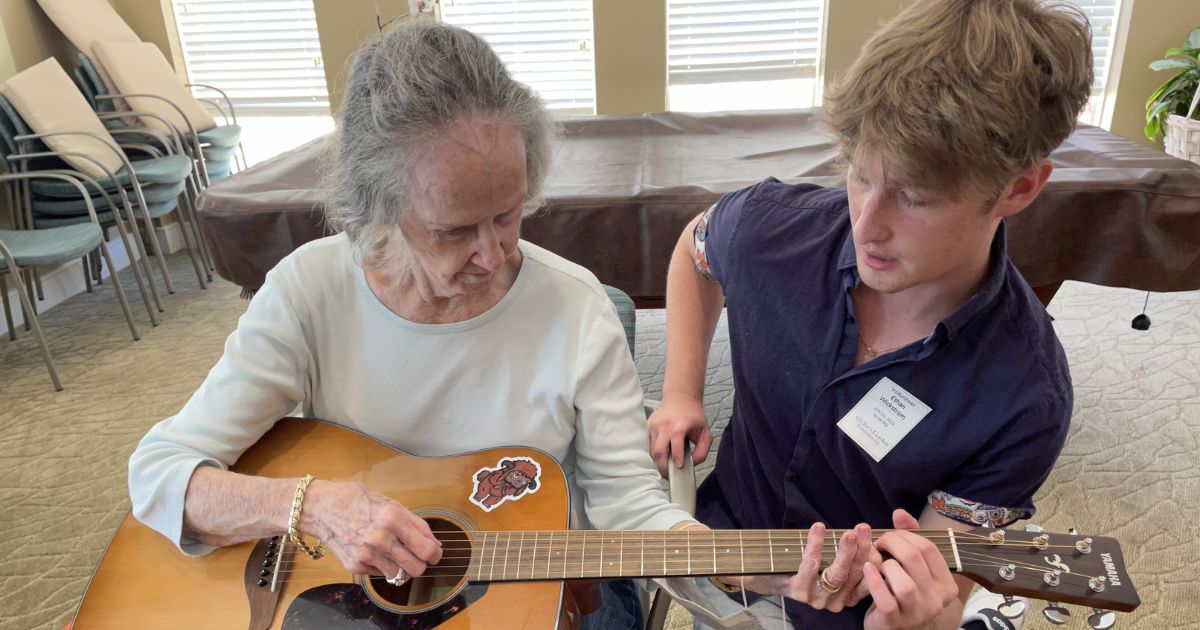When an aging loved one receives a diagnosis of Alzheimer’s disease or another form of dementia, families face numerous decisions about care. The progressive nature of dementia means that needs will change over time and what may work today may not be sufficient a few years from now.
Understanding what memory care options you have can help you prepare for your loved one’s present and future care needs. This blog from Abe’s Garden Community covers three approaches to provide meaningful support for individuals living with dementia: in-home care, memory support day programs, and residential memory care communities.
In-Home Care: Maintaining Familiar Surroundings
In-home care allows your loved one to remain in a familiar environment while receiving professional support and care. This option typically works best in the early to moderate stages of cognitive decline.
Benefits:
- Routine and familiar surroundings
- One-on-one personalized attention
- Purposeful engagement designed to enhance overall wellness and reduce agitation and anxiety
- Flexible scheduling
- Cost-effective for those requiring only a few hours of care
Considerations:
- Primary caregivers may experience stress and isolation
- Home safety modifications may be necessary
- Increasing care needs can become expensive
- Limited social interactions for your loved one
In-home care services can range from companionship and light housekeeping to medication management and specialized activities and communication techniques. Many families find that in-home care works well combined with other support services like adult day programs.
Explore Abe’s Garden at Home >>
Memory Support Day Programs: Flexible Middle Ground
Memory support day programs, or adult day programs, are a popular memory support option to bridge the gap between full-time home care and residential memory care. These programs provide structured activities, social interaction, and professional supervision during the week.
They provide family caregivers with respite during the daytime hours so they can continue to work or fulfill other everyday commitments. This type of programming ensures older adults living with dementia are safe and engaged, which provides peace of mind for their families.
Benefits:
- Structured social engagement with peers and trained staff
- Cognitive stimulation through therapeutic programming and physical exercise
- Professional oversight from a specially trained team
- Respite for family caregivers to work, run errands, or simply recharge
- Gradual transition from in-home care to residential memory care
- More affordable than full-time home care or residential memory care placement
Considerations:
- Behavior and care needs may exceed what an adult day program can manage
- Time to adjust to a new daytime environment away from family caregivers and familiar surroundings
- Location from home and transportation services
- Long-term costs of ongoing adult day programming
Some programs may provide meals and snacks, and also offer specialized services such as transportation, medication supervision, and coordination with healthcare providers.
Residential Memory Care Communities: Specialized 24/7 Support
Residential memory care communities provide round-the-clock specialized care in a secure environment designed specifically for individuals living with Alzheimer’s or other forms of dementia or cognitive decline.
Memory care communities are necessary when safety concerns, behavioral changes, or care needs exceed when can be safely managed at home or in an adult day program setting.
ting a conversation with an aging loved one about adult day services can be emotional and challenging at times. Many seniors value their independence, and discussions might initially be met with some resistance.
Fortunately, approaching the topic with empathy, honesty, and compassion can be a more positive experience for everyone. Get practical tips for having a conversation about adult day programs in this blog from Abe’s Garden Community.
Benefits:
- Secure environment with safety features and way-finding aids
- Specially trained staff experienced in dementia care techniques
- Structured daily programming and therapeutic activities
- 24/7 medical supervision and emergency response
- Specialized dining programs
When to Consider Memory Care:
- Safety becomes a primary concern, due to wandering, falls, or accidents
- Behavioral changes become difficult to manage
- Family caregivers experience burnout or health issues
- Medical needs require ongoing professional supervision
Learn about Abe’s Garden Memory Support Center >>
Making the Right Choice for Your Family
The dementia care journey may look different for each family and involve multiple care options over time. Often, families begin with in-home care, add adult day programming, and eventually transition to residential memory care as the disease progresses.
Remember that the right choice is the one that best serves both your loved one and your family support system. Quality of life, safety, and overall well-being should be prioritized when making important care decisions.
Are You Ready to Explore Memory Support Day Programs?
Download our free guide to help you understand the options available to you and your loved one. You’ll learn about our approach at Abe’s Garden Club, the benefits of memory support day programs, our program details, and how to see if ours is right for your loved one.

